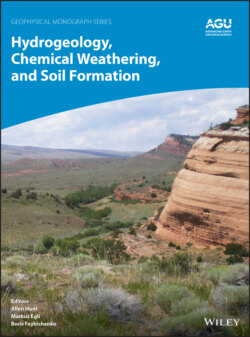Читать книгу Hydrogeology, Chemical Weathering, and Soil Formation - Allen Hunt - Страница 30
1.5.1. The Critical Zone
ОглавлениеAs defined by the National Research Council (2001, 37), the critical zone is
a dynamic interface between the solid Earth and its fluid envelopes, governed by complex linkages and feedbacks among a vast range of physical, chemical, and biological processes. These processes can be organized into four main categories: (1) tectonics driven by energy in the mantle, which modifies the surface by magmatism, faulting, uplift, and subsidence; (2) weathering driven by the dynamics of the atmosphere and hydrosphere, which controls soil development, erosion, and the chemical mobilization of near‐surface rocks; (3) fluid transport driven by pressure gradients, which shapes landscapes and redistributes materials; and (4) biological activity driven by the need for nutrients, which controls many aspects of the chemical cycling among soil, rock, air, and water. [italics in original]
Henry Lin (2011) rightly pointed out that soils can be literally called the critical component of the Earth’s critical zone (see also Wilding & Lin, 2006).
A key feature of critical zone research is its integrative nature. The multifarious components of the critical zone have engaged scientists from distinct and often isolated disciplines: vegetation by botanists, soils by soil scientists, groundwater by hydrogeologists, and substrate by geologists. Important though such separate studies be, predicting the overall behavior of the critical zone demands a combined effort, not least because the functional, emergent properties of such a complex system are the result not only of its various parts but also of the interactions among its parts (Chorover et al., 2007). Recent publications point to the value of integrative modeling (e.g. Banwart et al., 2017). Critical zone research has gained enormously from National Science Foundation funding, and it has led to the increased inclusion of geochemical reaction models and concepts in soil science.
